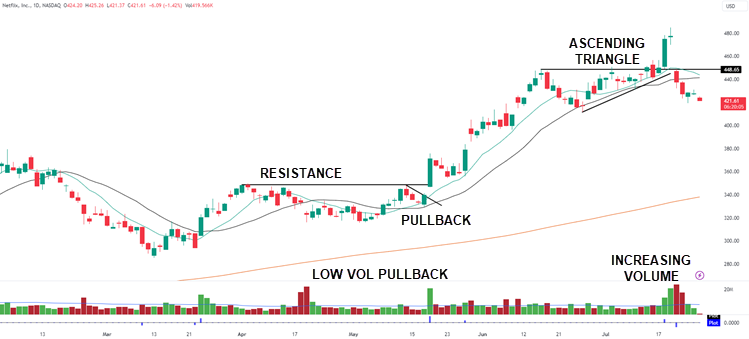- September 18, 2023
- Posted by: Shane Daly
- Categories: Day Trading, Trading Article

While many may argue that day trading is akin to gambling, the truth is far more complex. Yes, both involve making quick decisions for profit or loss, but that’s where the similarities end.
Day trading stocks is not a roll of the dice; it is a calculated move that traders make when price is lining up with their trading strategy.
 Let’s look at why day trading should never be mistaken for gambling. We will explore the analytical nature of day trading, its reliance on strategy and knowledge, and how careful risk management sets it apart from games of chance.
Let’s look at why day trading should never be mistaken for gambling. We will explore the analytical nature of day trading, its reliance on strategy and knowledge, and how careful risk management sets it apart from games of chance.
Understanding Stock Trading
Stock trading involves buying and selling shares in a company or financial asset. The goal is to profit from predicting price changes, with short-term gains generally valued over long-term gains for traders.
An interesting statistic shows that approximately 80% of day traders fail within their first year, highlighting the caution and skill that is required to trade.
Understanding volatility and analyzing price action are important parts of trading stocks. Traders must develop risk management strategies to protect themselves from potential losses. While emotions can impact trading decisions, successful traders rely on logic and reason rather than impulsive actions driven by feelings.
Reasons for Trading Stocks
Traders engage in trading stocks to capitalize on price fluctuations and profit from short-term gains. The decision to trade stocks is driven by various reasons, including the desire to make money as income, hedge other investments, and identify opportunities for future growth in retirement accounts. However, it is important to note that trading stocks is a risky endeavor that requires caution and proper research.
One of the key factors influencing stock prices is market demand and supply. Investors need to analyze trends and assess the potential impact of economic indicators, company performance, and industry developments on stock prices.
Understanding the fundamentals of a company such as its financial health, management team, competitive position, and growth prospects can help inform investment decisions.
 There are traders who do not worry about the company itself and trade solely on the basis of price action.
There are traders who do not worry about the company itself and trade solely on the basis of price action.
To mitigate risks associated with stock trading, investors employ risk management strategies such as diversification of their portfolio or setting stop-loss orders to limit potential losses.
Trading stocks offers the opportunity for both long-term and short-term gains. It requires careful analysis of price movements and individual companies along with effective risk management strategies.
Comparing Trading and Gambling
When comparing risks, analyzing markets, emotional control, long-term profitability, and skill versus luck, it becomes clear that day trading is not simply a game of chance. Trading involves assessing trends and making your decisions based on analysis and research.
| Comparing Risks | Analyzing Markets |
|---|---|
| Day trading involves risk management strategies to limit losses | Traders use tools and analysis to determine which stocks to buy |
| Gambling relies on chance without any inherent control over outcomes | Gamblers rely on luck or favorable odds without analyzing underlying factors |
Gambling relies on luck and available odds.
Day traders exercise emotional control by relying on rationality and reason rather than letting emotions drive their decisions. Their goal is to achieve slow and steady profits over time, unlike gamblers who seek quick wins.
| Emotional Control | Long-Term Profitability |
|---|---|
| Day traders approach trading with rationality and reason | Slow but steady gains lead to sustained profitability |
| Gamblers may be driven by emotions like excitement or desperation | Quick wins may not necessarily result in long-term financial success |
Successful day traders utilize facts, figures, and analytical tools to inform their strategies. Day trading requires knowledge, skillful decision-making, and adaptability to market conditions for long-term profitability.
| Skill vs Luck |
|---|
| Day traders utilize knowledge of technical analysis |
| Gamblers rely solely on luck or random chance |
There are distinct differences between day trading and gambling when considering risk assessment, analytical approaches to markets, emotional control during decision-making processes, long-term profit goals instead of seeking quick wins, and the reliance on skills rather than pure luck.
Informed Decisions in Trading
By analyzing trends, price movements and the overall market conditions, traders make calculated decisions that set them apart from gamblers. Day traders rely on technical analysis to identify patterns and trends in stock prices, allowing them to predict potential price movements with some degree of accuracy.
 They also use risk management strategies to limit losses and protect their capital. Information and research play a role in day trading, as traders will often monitor news, company reports, and economic indicators that may impact the market. This helps them stay ahead of developments and make decisions based on objective data rather than relying solely on luck or chance.
They also use risk management strategies to limit losses and protect their capital. Information and research play a role in day trading, as traders will often monitor news, company reports, and economic indicators that may impact the market. This helps them stay ahead of developments and make decisions based on objective data rather than relying solely on luck or chance.
Successful day traders understand the importance of thorough analysis and rational decision-making in achieving consistent profits in the volatile world of trading.
| Analyzing Trends | Technical Analysis | Risk Management | Information & Research |
|---|---|---|---|
| Identifying patterns and trends | Utilizing charts, indicators, and tools | Implementing stop-loss orders | Monitoring news, reports, and economic indicators |
| Predicting potential price movements | Identifying support/resistance levels | Diversifying portfolio | Staying updated with market developments |
| Adapting strategies based on market conditions | Recognizing chart patterns | Managing leverage effectively | Analyzing company fundamentals |
The Importance of Strategy
One of the key benefits of having a strategy in day trading is the ability to analyze trends/ranges effectively. By studying past performance and using technical analysis tools, you can identify patterns and make decisions about when to enter or exit trades.
Risk management strategies play a role in minimizing losses and maximizing profits. Setting stop-loss orders and adhering to predetermined risk limits can help protect your capital.
Another important aspect of strategy is maintaining emotional control in trading. By sticking to your plan and not letting emotions dictate your actions, you can avoid impulsive decisions that may (will) lead to financial losses.
Closing Thoughts
Having a well-crafted strategy will help you avoid potential pitfalls in trading that are usually emotionally based. Day trading education plays a role in developing these strategies, giving you with the knowledge and skills needed to tackle the often challenging trading environment.
Emotional control also plays a huge role in day trading, as it allows traders to manage their emotions effectively and make rational decisions even during heightened market volatility.
Strategies for managing risk are essential in day trading, as they help minimize potential losses and protect capital. Market volatility can have a significant impact on day trading outcomes, making it vital for traders to adapt their strategies accordingly.
Discipline is key in day trading, ensuring that traders stick to their strategies and avoid impulsive decision-making.
Frequently Asked Questions
What differentiates trading from gambling?
While trading and gambling share some similarities, they differ significantly. Trading involves analysis, research, and informed decision-making, whereas gambling relies mainly on chance. Traders often use strategies, risk management, and market knowledge to inform their actions.
In what ways is day trading distinct from gambling?
Unlike gambling, stock trading is based on analyzing financial data, company performance, market trends, and economic indicators. Traders use this information to make informed decisions, reducing reliance on chance. While risk is inherent in both activities, trading is driven by research and analysis rather than pure luck.
Are there aspects in which trading is considered more favorable than gambling?
Comparing the risks of trading and gambling is subjective. Both involve potential losses, but trading allows for informed decision-making, risk management, and strategic planning. Gambling, on the other hand, primarily depends on chance. Success in trading often requires knowledge and skill, whereas gambling is more reliant on luck.
To what extent does luck influence day trading?
Successful day traders utilize technical analysis, chart patterns, and market indicators to identify opportunities and make quick decisions. While luck can play a minor role, it is the traders’ skills, experience, and market understanding that predominantly determine their success.
What are the reasons behind the challenges faced by day traders in making profits?
Day traders may struggle to make money due to various factors, including inadequate market knowledge, poor risk management, emotional decision-making, and unpredictable market fluctuations. Successful day trading demands discipline, a well-tested strategy, and the ability to adapt to changing market conditions.
Can day trading be a sustainable source of income?
While it is possible to make a living through day trading, it is challenging and requires significant dedication, discipline, and risk management. Many aspiring day traders experience losses and may not achieve consistent profitability. Success in day trading depends on a combination of skill, experience, and access to adequate capital.
Conclusion
Day trading should not be mistaken for gambling. Day traders rely on analysis, research, and rational decision-making to make trading decisions. They use strategies, risk management techniques, and market knowledge to minimize losses and maximize profits.
Unlike gambling, day trading is based on careful planning and analysis rather than relying on luck or chance.
By understanding the distinctions between day trading and gambling, traders can approach the market with discipline and a well-crafted strategy for long-term profitability.
